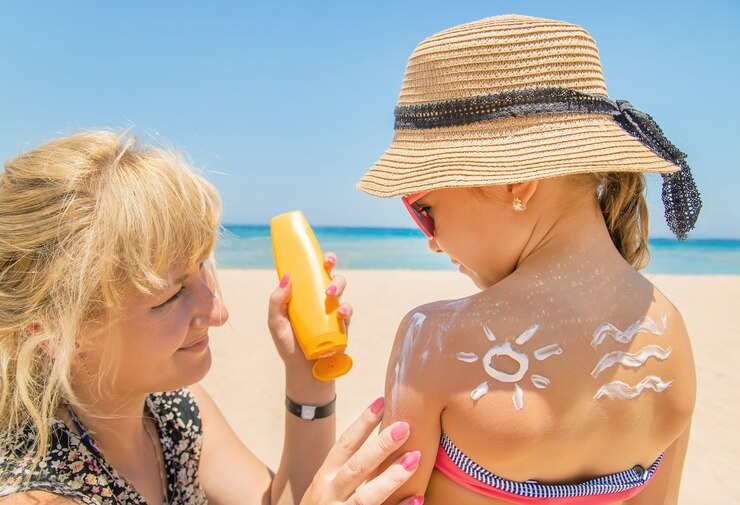
Our skin is the largest organ of our body, and it deserves the utmost care, especially when it comes to sun block sunscreen. Sun exposure is an inevitable part of daily life, but it’s crucial to understand the significant risks it poses to our skin. Whether you’re enjoying the outdoors, exercising, or simply commuting, the sun’s harmful UV rays can damage your skin over time, leading to various skin problems, including premature aging, sunburns, and even skin cancer.
In this article, we’ll explore why sunblock is an essential part of your skincare routine and how products like The Skin Lab can help protect your skin from these harmful effects.
What Is Sunblock?
Sunblock, also known as sunscreen, is a skincare product designed to protect the skin from the sun’s ultraviolet (UV) radiation. There are two primary types of UV radiation: UVA and UVB. UVA rays penetrate deep into the skin, causing premature aging and wrinkles, while UVB rays are responsible for sunburns. Both types of UV rays can damage the DNA of skin cells, which increases the risk of skin cancer.
Sunblock works by either absorbing or reflecting UV radiation. It contains active ingredients such as zinc oxide, titanium dioxide, avobenzone, or octinoxate, which act as physical or chemical barriers to prevent UV rays from penetrating the skin. By applying sunscreen regularly, you protect your skin from these potentially harmful effects, reducing the likelihood of skin issues.
Why You Need Sun Protection Every Day
Even if it’s cloudy or you’re indoors most of the day, the need for sun protection does not diminish. The harmful UV rays can penetrate through clouds and glass windows, meaning your skin is exposed to them regardless of the weather or location. According to dermatologists, daily sun protection is essential to prevent long-term skin damage.
Additionally, harmful UV exposure can happen even during short periods of time. Simply walking outside for a few minutes without sunscreen can contribute to sun damage. The cumulative effects of these small exposures over the years can lead to serious skin concerns. Regular use of sunblock can help shield your skin from both short-term and long-term damage.
The Effects of Sun Exposure on the Skin
-
Premature Aging: The most noticeable effect of UV exposure is premature skin aging. Over time, UV radiation breaks down the collagen and elastin fibers in the skin, leading to fine lines, wrinkles, and sagging skin. This condition is known as photoaging, and it can be easily prevented with the regular application of sunblock.
-
Sunburns: Sunburn is another common consequence of excessive sun exposure. Sunburns occur when the skin becomes inflamed due to UV damage. This condition can be painful, causing redness, swelling, and peeling. Sunburns are not only uncomfortable, but they also increase the risk of developing skin cancer later in life.
-
Skin Cancer: Long-term UV exposure is the leading cause of skin cancer, including melanoma, the most dangerous form of skin cancer. The UV radiation damages the DNA in skin cells, which can lead to mutations and uncontrolled cell growth. Using sunblock daily helps to minimize this risk significantly.
Choosing the Right Sunblock
When selecting a sunblock, it’s important to consider your skin type, the level of sun exposure, and the type of activities you’ll be engaging in. Broad-spectrum protection is essential, as it guards against both UVA and UVB rays.
-
SPF (Sun Protection Factor): SPF is an important factor when choosing sunblock. SPF 30 is recommended for daily use, providing 97% protection against UVB rays. For extended outdoor activities or prolonged sun exposure, consider higher SPF levels like SPF 50 or higher.
-
Water Resistance: If you plan to swim or exercise outdoors, choose a water-resistant sunscreen to ensure that it stays effective even when you sweat or get wet.
-
Skin Type Considerations: Individuals with sensitive skin should opt for sunscreens that are fragrance-free and formulated with gentle ingredients. If you have oily or acne-prone skin, look for non-comedogenic sunscreens that won’t clog pores.
Why The Skin Lab Sunblock Stands Out
The Skin Lab, a trusted brand in the skincare industry, has developed sunblock products that cater to various skin needs while offering high-quality protection. Whether you’re looking for a lightweight, non-greasy formula or an option that provides broad-spectrum protection with added skincare benefits, The Skin Lab delivers innovative solutions.
Their products are formulated with skin-friendly ingredients that not only protect the skin from UV damage but also nourish and hydrate. For example, their sunscreen includes antioxidants like Vitamin C and E, which help fight free radicals and reduce oxidative stress on the skin caused by sun exposure. With The Skin Lab sunblock, you can enjoy the benefits of sun protection and skincare all in one.
Moreover, The Skin Lab understands the need for products that are suitable for all skin types, including sensitive and acne-prone skin. Their non-comedogenic formulations ensure that you won’t have to worry about clogged pores or breakouts while still enjoying the benefits of SPF protection. Whether you’re looking for a sunscreen for daily wear or a more specialized formula for outdoor activities, The Skin Lab has you covered.
The Final Word on Sun Protection
Daily sun protection is essential for maintaining healthy skin and preventing long-term damage from harmful UV rays. Sunblock is a simple yet effective way to safeguard your skin from the negative effects of the sun, such as premature aging, sunburns, and skin cancer. By choosing a high-quality sunscreen like The Skin Lab, you can enjoy superior sun protection while nourishing and enhancing your skin’s overall health.
Incorporating sunblock into your skincare routine every day, rain or shine, is one of the best steps you can take to preserve your skin’s health and beauty for years to come.




Leave a Reply